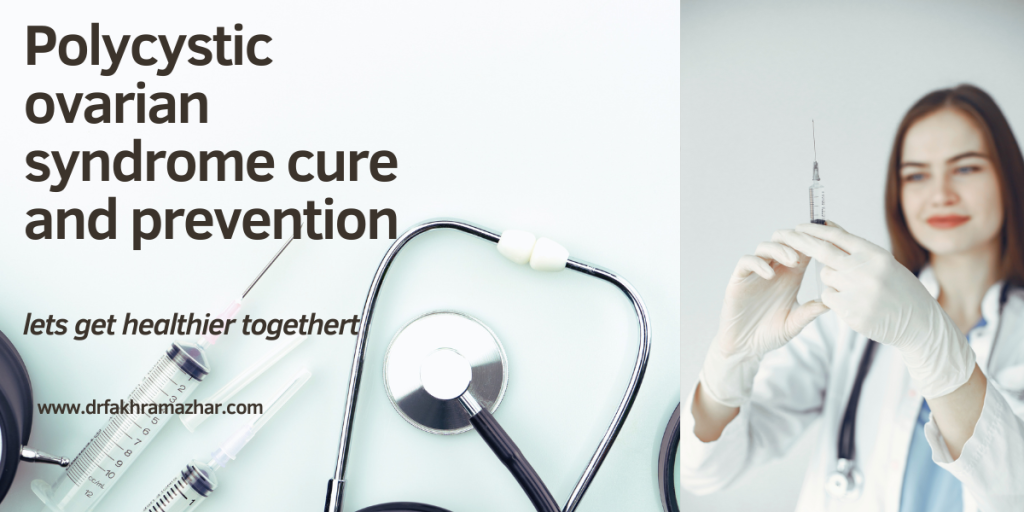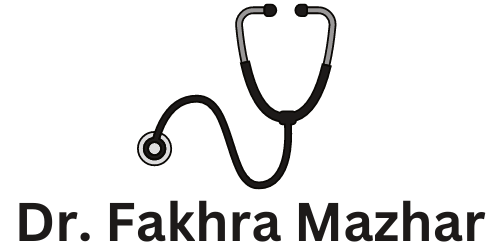
Stein-Leventhal syndrome.
PCOD / PCOS affects almost 5% of females of reproductive age. It is described as a heterogeneous disorder associated with multiple ovarian follicular cysts and hyperplasia of theca interstitial cells.
Causes:
The exact cause of polycystic ovarian disease is unknown.
Pituitary dysfunction
The abnormalities of hormones secreted by pituitary are the main cause of pcos. When there is a very high level of serum luteinizing hormone and a low level of follicle stimulating hormone, it ultimately leads to PCOS.
Hereditary:
Recent research on PCOS has clearly shown that PCOS is hereditary. If a mother had PCOS her daughters are at a high risk of having PCOS. About 60-70% of daughters of a PCOS patient may develop PCOS early or late in their life. So, it is genetic and runs in families.
Excess androgens production by ovaries:
Excess LH hormone over-stimulates ovaries leading to excess production of androgens eg, DHEAS, DHEA, TESTOSTERONE etc. and steroidogenesis leading to hyperandrogenism.
Stress:
Stress for a prolonged time could also be a source of developing PCOS. It can be explained on the basis that prolonged stress may cause dysfunction of cortisol. When there is excess cortisol it disrupts insulin secretion leading to PCOS and diabetes and acne etc.
Obesity:
PCOS mainly occurs in obese females. This can be explained on the basis that obesity leads to insulin resistance and insulin resistance in turn leads to type-2 diabetes that exacerbate PCOS.
Features:
Endocrine:
- Hyperandrogenism
- LH hypersecretion
Reproductive:
- Menstrual abnormalities
- Anovulation
- Decreased fertility
Metabolic:
- Increased insulin resistance
- Dyslipidemia
- Fatty liver disease(non-alcoholic)
Obesity:
- Hyperglycemia
- Elevated estrogen
Clinical manifestations:
PCOD/PCOS patients also present with irregular heavy menstrual bleeding. They are obese due to hyperglycemia and insulin resistance and suffer from hirsutism and may also suffer from type-2 diabetes mellitus. Polycystic ovarian disease ultimately leads to degeneration of follicles and endometrial carcinoma.
Hirsutism :
Hirsutism is characterized by the presence of excessive , dark and coarse hair on the body parts where hair is normally absent. Hair presents a male-like pattern on the face, chest and back.
Cystic degeneration of follicles:
Estrogen feedback decreases Follicle stimulating hormone. This abnormal hormonal level prevents the normal growth and maturation of ovarian follicles. The abnormal follicles are unable to release oocytes normally. Number of immature follicles increases greatly in ovaries leading to their destruction.
Endometrial carcinoma:
The risks for endometrial carcinoma greatly increase in polycystic ovaries. The reason behind the increased risk of carcinoma is that the endometrium is exposed to high levels of estrogen for a prolonged period of time confounded by diabetes, hypertension and obesity.
Type -2 diabetes mellitus:
Insulin, a sugar-regulating hormone, regulates blood glucose level. PCOS patients have insulin resistance i.e. their body effectively synthesis insulin but they can’t utilize it. So the blood glucose could not be regulated and it begins to be excreted in urine. have a quick look at Type-2 Diabetes
https://www.drfakhramazhar.com/type-2-diabetes-mellitus/
Menstrual abnormality:
Females with PCOS have oligomenorrhea and irregular periods due to excessive production of androgens like testosterone ( a male hormone ) that interrupts ovulation.
Infertility:
PCOS patients are infertile due to anovulation. About 60- 70 % PCOS patients suffer from anovulatory infertility.
Diagnosis:
PCOS can not be diagnosed by a single test.
Blood test
By blood test we can check the levels of hormones essential for the reproductive system to function normally.
Pelvic examination
Pelvic examination through ultrasound can help look for any masses or cysts in the follicle i.e, to inspect for any polycysts in ovaries.
Glucose tolerance test
Plasma glucose level >200mg/dl after an overnight fast indicates diabetes, a leading cause of PCOS.
Treatment of PCOS:
There is currently no cure for Polycystic ovarian syndrome but the long term health problems confound by PCOS can be relieved using several treatments and symptoms can be minimized. Females having excessive male like hair growth, trouble getting pregnant, irregular periods and acne should consult a physician.
- First line treatment of PCOS is weight loss that reverses hyperinsulinemia.
- Metformin is given to increase body response to insulin so that type-2 diabetes can b cured.
- Contraceptive pills can correct irregular menstruation
- Take medicines to treat acne.
- Lasers can help you with abnormal facial hairs.
- Treatment for infertility includes surgery to regulate ovulation.
- In vitro fertilization may be beneficial but to some extent only.
Lifestyle modification:
The symptoms for PCOS can be minimized by certain dietary and lifestyle modifications.
It includes maintaining a good hygienic diet to avoid obesity and type-2 diabetes. Do exercise on a regular basis. Take good care of your health. Regards.

One Response